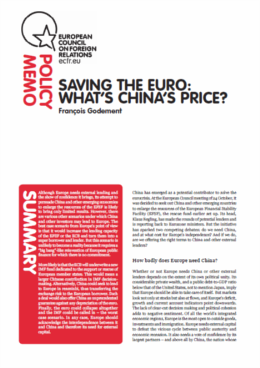China’s Price for Rescuing the Euro
What price will Europe pay for China’s help in rescuing the euro?
With the health of the euro now critical, the search goes on for emergency financing from around the world. The head of the European Financial Stability Facility (EFSF), Klaus Regling, is today reporting back to Eurozone finance ministers on the willingness of external lenders – especially China – to contribute to a euro rescue fund.
But although Beijing is readying itself for a range of new investments in Europe, the head of China’s main sovereign fund, Lou Jiwei, now says the target is infrastructure spending rather than euro rescue funds. Chen Deming, China’s Minister of Commerce, says he looks forward to the sale of European assets thanks to the euro crisis.
A new ECFR paper by Francois Godement, ‘Rescuing the euro: what is China’s price?’, looks at two crucial questions: Does rescuing the euro need China, and, if it does, at what cost for European independence? This follows ‘The Chinese scramble for Europe’ (ECFR July 2011), predicting these developments. In his new paper, Francois argues:
-
Although the US has borrowed extensively from China for a decade without making major concessions,European disunity on debt management will make it a struggle for the EU to avoid such concessions to Beijing. But the more united and transparent the European borrowing process is, the more leverage Europe will have in dealing with China and other creditors. Political will and commitments from Europe must also be explicit, and not shielded from public view.
-
China (among Asian and other economies) wants to invest money away from the dollar, and has an interest in preserving and growing exports in Europe. It also fears the global bust that would follow a deep European recession or systemic crisis.
-
But China is deeply risk-averse, and particularly unenthusiastic about the sort of political uncertainty that Europeans are creating for themselves– both in domestic politics and in their byzantine institutional set-ups. Any large-scale investment in European bonds would have to be explained at home as a safe investment. China’s financial decision makers look primarily for safe havens. They may fear American monetary policies, but are repulsed even more by European political doubts.
- China will therefore “help” Europe if Europe helps itself. This means setting up a convincing argument and guarantees for outside investors. The eurozone must be seen again as an effective debt union, with member states taking on at least as much risk as external lenders.
‘Rescuing the euro: what is China’s price?’ explores several scenarios:
1. Best case: Eurozone as a new sovereign – with the EFSF emerging as a European super borrower and lender, with unassailable guarantees. China shifts some currency reserves towards the euro.
2. Medium case: a sovereign with crutches – thanks to a time/credibility gap, lenders impose IMF conditionality, or an IMF loan vehicle. China may even employ the opportunity to further its onw goal; the internationalisation of the renminbi and choose it as the currency for the new lending, transferring exchange risk to the European borrowers.
3. Worst case: a run for the lifeboats – if the EFSF fails to contain the systemic crisis or the Eurozone is unable to negotiate terms with the IMF and others, the IMF may undertake direct country by country rescue, each with different contributors and conditions, with the public knowledge that they cannot rescue larger economies. The Eurozone loses all traction on the debt crisis. Creditors – including China – are in the driving seat.
A Spanish version of the paper can be found here.
Contact: [email protected] ([email protected] +44 20 7227 6880)
Facts:
- China’s trade surplus with Europe has grown from €55 billion when the euro was introduced to between €160-€180 billion in 2011 (the world’s largest bilateral trade imbalance).
- The EU is China’s largest customer, absorbing 23% of Chinese exports.
- Debt figures are not the whole story. Japan has a debt to GDP ratio of 220%,but sells 10 year bonds with an interest rates of under 1%. The difference in Europe is the failure of politicians to deal with the increasing rate of risk of a catastrophic collapse.
In a Financial Times op-ed, ‘China can help west build economic growth’ (November 28th 2011) Lou Jiwei put the case for Beijing to become a significant investor in infrastructure in the EU and US, rather than a contractor.
The European Council on Foreign Relations does not take collective positions. ECFR publications only represent the views of their individual authors.



